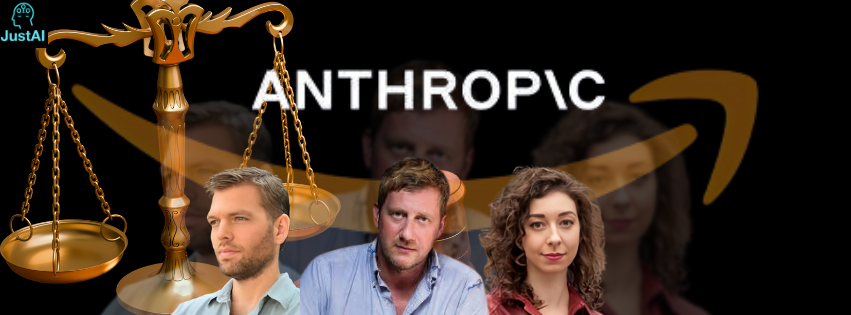Key Highlights
- Anthropic Faces Legal Action: The Amazon-backed AI startup Anthropic has recently been hit with a class-action lawsuit in a California federal court, accusing the company of copyright infringement.
- Industry Implications: This lawsuit is indicative of a broader trend of legal challenges faced by AI companies, as they struggle with the complexities of using copyrighted content to train machine learning models and such rapid advancement of AI technologies has outpaced existing legal frameworks, leading to a growing number of disputes over intellectual property rights.
- Potential Impact on AI Development: The outcome of this lawsuit could set a significant precedent for the AI industry, potentially leading to tighter regulations and changes in how AI models are trained and if the court rules in favour of the plaintiffs, it could force AI companies to rethink their training practices, requiring them to obtain proper licenses for the use of copyrighted material or develop alternative methods for training their models.
The world of artificial intelligence is being questioned consistently, giving rise to several issues each passing day, as Anthropic, one of the leading AI startups, that has received a boost from Amazon, now finds itself at the centre of a class-action lawsuit filed on 19th August 2024. A lawsuit filed in California Federal Court accuses Anthropic of training its AI chatbot, Claude, on copyrighted books without authorization and three established authors who claim that intellectual property has been misused to build a multibillion-dollar business are responsible for bringing in the suit.
Unauthorized Use of Copyrighted Works
The lawsuit was brought forth by authors Andrea Bartz, Charles Graeber, and Kirk Wallace Johnson because it was claimed that Anthropic used pirated copies of their books, among others, to train its AI model Claude and in line with this, the authors claim that licensing for the use of the works had not been sought by Anthropic, thereby infringing on their copyright. The plaintiffs said that due to this practice, Anthropic has held an unfair advantage in the fast-growing AI market, building a business worth billions of dollars, and what makes this case highly significant is that it puts into focus the continuous tug of war between technological advancement and the rights of content creators.
Industry-Wide Implications
One of many lawsuits flying around against AI companies for the use of copyrighted material, this lawsuit against Anthropic is just the latest case in a long line stretching over the past few years involving tech giants OpenAI and Meta Platforms over similar claims. The lawsuit indicates that creators like authors, musicians, and others are increasingly concerned about their works being used in AI technology developments and as more and more creators push back against the perceived exploitation of their intellectual property, AI companies find themselves in increasingly difficult legal waters. The potential result is the remaking of how AI models are trained, most importantly in regard to proper licensing of content and compensation for creators of same.
Impact on AI Development and Copyright Law
The Anthropic lawsuit is much more than a simple copyright infringement case as it sits at the crossroads of law, where larger questions about the future of AI development are needed to be answered and if the court decision goes in favour of the plaintiff, it could set a future precedent, forcing AI companies to reconsider their training methods and seek legitimate avenues for making use of copyrighted content. This case might further compel the legislative arm of the government to review the existing copyright frameworks for new regulations, considering the special challenges arising from AI technologies, where clear and fair guidelines for the use of copyrighted materials will increasingly be needed as A.I. technology strengthens and becomes more prevalent in various industries.
Anthropic’s Response and Future Outlook
Anthropic has so far remained silent over the lawsuit as the company, founded by ex-executives from OpenAI—sibling siblings Dario and Daniela Amodei, has been getting a lot of attention because of its AI chatbot, Claude. However, this legal challenge could be a threat to its reputation and future operations where the lawsuit puts additional pressure on Anthropic and other AI companies to find ways of legitimately using copyrighted content, and in contrast to tech firms, AI companies are more challenged by the complexities pertaining to Intellectual Property Rights. The lawsuit will be closely watched by observers who can see how Anthropic is going to deal with it, as it may possibly affect the broad AI industry at large, where an adverse ruling against Anthropic could open the way for a raft of similar lawsuits, which would further muddy the development and deployment of AI technologies.
Conclusion
Anthropic’s lawsuit reflects a turning point in the conflict between AI and copyright. As AI technologies go through another dimension of evolution, so must the legal frameworks that govern their development to protect the rights of content creators and it may set a very wide precedent for both the AI industry and the tech community in large. After all, it just might end up deciding how, going forward, AI systems are trained and how creators can protect their intellectual property in the age of digital consumption, but for now, however, all eyes are on the courtroom as this high-level legal battle plays out with billions on the line and implications that just might reshape the future of AI and copyright law.
References
https://www.theguardian.com/technology/article/2024/aug/20/anthropic-ai-lawsuit-author

